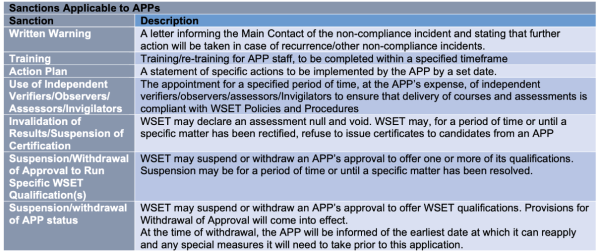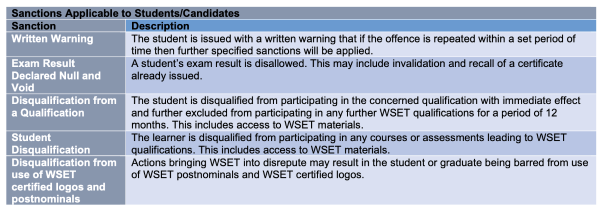WSET Supplementary Enrolment Policies
PRIVACY AND DATA PROTECTION
NZSFW privacy and data protection policy acknowledges that NZSFW will share personal data with WSET.
This includes name(s), date of birth, gender, email address and documentation provided for reasonable adjustment or special consideration applications.
The data passed to WSET will be handled in accordance with WSET's Privacy Policy.
CANCELLATIONS AND REFUNDS
Please view NZSFW enrolment, transfer, cancellation and refunds policy here.
DIVERSITY AND EQUALITY POLICY
NZSFW will comply with the Human Rights Act 1993 of New Zealand. Please view details here.
NZSFW is a signatory The Education (Pastoral Care of Tertiary and International Learners) Code of Practice 2021.
COMPLAINTS AND APPEALS PROCEDURE FOR WSET PROGRAMMES
NZSFW will follow the How to Deal with Student Complaints section in the WSET APP Handbook which details what this policy must include and the order of process for complaint resolution.
NZSFW will define in detail, what happens if there is an issue: how is a complaint submitted, to whom (include contact details) and what information should be included.
NZSFW will provide details for timeframes for resolution and any appeal procedures.
Complaints must first be addressed formally, in writing to the NZSFW.
Only after all attempts for resolution have been exhausted can the complainant raise
their complaint with WSET at QA@wsetglobal.com
WSET Enquiry and Feedback form
This Enquiry and Feedback form enables candidates to request an enquiry (re-mark) against examination results or an
enquiry and feedback on their scripts.
Download the form here.
REASONABLE ADJUSTMENTS
Both WSET and NZSFW want to make WSET assessments accessible for all students, so none are at an advantage or disadvantage based on a disability or differing ability. This policy and the reasonable adjustment process allows us NZSFW to work with you, our student, before an assessment to gather the information we need to submit a request to WSET and work with them to make arrangements that give students access to WSET qualifications.
A reasonable adjustment is any accommodation or arrangement that helps to reduce the effect of a known disability or difficulty that substantially disadvantages a student’s assessment. Using a reasonable adjustment does not impact how WSET grades your exam, or your result, but WSET cannot agree to reasonable adjustments where your particular difficulty directly affects performance necessary to complete the assessment outcomes (e.g. inability to smell or taste for a Level 3 Exam).
The goal of a reasonable adjustment is to give you equal access to a WSET qualification, not to give unfair advantages over other students who take an assessment without the same adjustment, or to affect the overall reliability of the assessment outcomes that are explained in the course Specification.
- Examples of reasonable adjustments may be: Changing standard assessment arrangements, for example, allowing
candidates extra time to complete the assessment activity; - Adapting assessment materials, such as providing materials in large text
format; - Providing access facilitators during assessment, such as a sign language interpreter or reader;
- Re-organising the assessment room, such as the removal of visual stimuli for an autistic candidate.
NZSFW will gather the information we need from you to submit a Reasonable Adjustment Application form to WSET.
WSET must approve and arrange reasonable adjustments before the assessment activity takes place. Before completing enrolment with NZSFW, we will give all students access to this policy and the chance to identify any special needs that could require a reasonable adjustment.
If a student identifies a special need, NZSFW will give the student the Reasonable Adjustment Application form as soon as possible and work with the student to gather the necessary information.
For any student seeking a reasonable adjustment, please contact NZSFW with:
- Your full name;
- contact information;
- description of the special need, disability or differing ability that requires an adjustment; and
- supporting documentation.
You must submit this information at least 20 working days before the exam date for Levels 1-3 qualifications. The information you submit will be shared with WSET and will be handled under WSET’s Privacy and Data Protection Policy.
NZSFW will keep records of all reasonable adjustment applications.
SPECIAL CONSIDERATION
Special consideration is any adjustment given to a student who has temporarily experienced an illness or injury, or other event outside of their control at the time of the exam that significantly affects their ability to take the exam or their ability to show their knowledge and understanding in the assessment.
Special consideration is only for things that happen immediately before or during an exam that has a material impact on your, the student’s, ability to take the exam or on your performance.
To be eligible for special consideration, you must have completed the whole course and would have been fully prepared if not for the temporary illness, injury or other uncontrollable event.
A special consideration may be for an individual (e.g. a student becomes ill the day of the exam) or a group of students (e.g. an exam is interrupted by a natural disaster).
You may be eligible for special consideration if:
- Your performance on the exam is adversely affected by an event outside of your control. This may include temporary illness,
temporary injury, bereavement or exam room conditions; - Reasonable adjustments that were agreed in advance of the exam proved inappropriate or inadequate;
- The application of special consideration would not make a passing result and certificate misleading about the student’s ability to satisfy the qualification’s assessment criteria.
APPLYING FOR SPECIAL CONSIDERATION
If you have taken an exam, or your exam is immediately approaching, and you feel that you have a temporary injury or illness, or other uncontrollable event that has interfered with your ability to complete your exam, please contact Celia Hay as soon as possible.
NZFSW will provide you with a Special Consideration Application Form, which must be completed and returned with supporting documentation within 6 working days after the effected exam. The information you submit will be shared with WSET and will be handled under WSET’s Privacy and Data Protection Policy.
If there has been serious disruption during an exam affecting a group of students, NZSFW will submit a detailed report of the circumstances and candidates affected to WSET to request special consideration. NZSFW will keep records of all applications for special consideration.
MALPRACTICE AND MALADMINISTRATION POLICY
Both NZSFW and WSET have policies and procedures in place to protect WSET students and safeguard the integrity of WSET qualifications. NZSFW ensures compliance with NZSFW and WSET’s policies through this Malpractice and Maladministration Policy, which gives a framework for both us and you to identify, report and manage potential malpractice or maladministration. Non-compliance with NZSFW or WSET Policies and Procedures can fall into two distinct, but related, categories:
MALADMINISTRATION
Where the non-compliance is generally unintentional, or the result of mistakes, carelessness, inexperience or poor processes; and
MALPRACTICE
Where the non-compliance is intentional or the result of a negligent or reckless action without consideration of the consequences of the action.
Context is important and the line between maladministration or malpractice is not always clear: for example, maladministration incidents may become malpractice (e.g. if you fail to implement corrective measures, repeat the same or similar incident, or attempt to misrepresent or hide information during an investigation); or there may be mitigating factors that turn potential malpractice into maladministration. Though malpractice and maladministration are distinct concepts, they can shade into one another. Malpractice and maladministration are always case, context and fact specific. Both APPs and students can commit malpractice and maladministration.
- There are many ways that malpractice or maladministration could occur, including new ways we have not seen yet. But some examples of malpractice or maladministration include:
- Failure to adhere to WSET Policies and Procedures;
- Failure to follow WSET requirements for course delivery or exam regulations;
- Failure to follow WSET’s candidate registration and certification procedures;
- Insecure storage of exam materials;
- Revealing or sharing confidential exam materials with candidates ahead of an exam;
- Intentional attempts to manipulate exam results so that they do not reflect the candidate’s
actual exam performance; - Issue of incorrect exam results/failure to issue results to students in a timely manner;
- Failure to timely respond to WSET;
- Unauthorised reading/amendment/copying/distribution of exam papers;
- Denying WSET access to information, documentation, workforce, and facilities;
- Any action likely to lead to an adverse effect.
- Failure to disclose a Conflict of Interest;
For students:
- Cheating, or facilitating cheating, including the use of unauthorised devices or materials;
- Plagiarism of any nature by students;
- Impersonation (including forgery of signatures);
- Unauthorised reading/amendment/copying/distribution of exam papers;
- Any action likely to lead to an adverse effect;
- Breach of confidentiality.
In general, we also expect that both NZSFW staff and our students should treat others and be treated professionally and respectfully at all times. We will treat inappropriate behaviour including verbal or physical abuse, persistent or unrealistic demands, or threats that cause stress to staff as misconduct and may report student misconduct to WSET as necessary.
REPORTING AND INVESTIGATION OF MALPRACTICE OR MALADMINISTRATION
As an APP, we aim to ensure compliance with WSET Policies and NZSFW policies and will keep records of potential or actual malpractice or maladministration by you, our students, or our staff.
We are required to notify WSET immediately of any non-compliance issues that could be malpractice or maladministration, so that WSET can investigate the non-compliance under their own Malpractice and Maladministration Policy.
We ask that you also raise any concerns or non-compliance issues that may be malpractice or maladministration with NZSFW as soon as possible by following the process outlined in our Complaints policy.
During WSET’s investigation, they may reach out to NZSFW or to you directly to request further information or conduct an interview. Please respond to any requests promptly and honestly.
MANAGING NON-COMPLIANCE
If WSET identifies malpractice or maladministration, they will consider its impact and may apply sanctions. WSET will take all reasonable steps to ensure the sanctions do not disadvantage uninvolved students affected by malpractice or maladministration. However, in
some cases, they may need to disallow or withhold results and/or certificates.

WSET will consider all relevant information on a case-by-case basis, balancing the facts with potential or actual effects, and against the seriousness of the sanctions against those effects.
WSET records all malpractice and maladministration incidents for both APPs and
students. If WSET determines that a student has committed malpractice or maladministration, they may apply one or any of the following sanctions:

APPEALS
If you wish to appeal penalties or sanctions WSET has imposed due to Malpractice or Maladministration, please follow the procedures laid out in WSET’s Complaints Policy.
CONFLICT OF INTEREST POLICY
Please read NZSFW's Conflict of Interest policy here.
RESIT FEES
- WSET Level 1 Award in Wines: $150
- WSET Level 2 Award in Wines: $225
- WSET Level 2 Award in Spirits $225
- WSET Level 3 Award in Wines: $350




